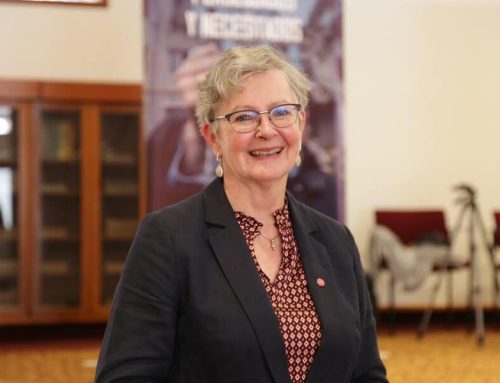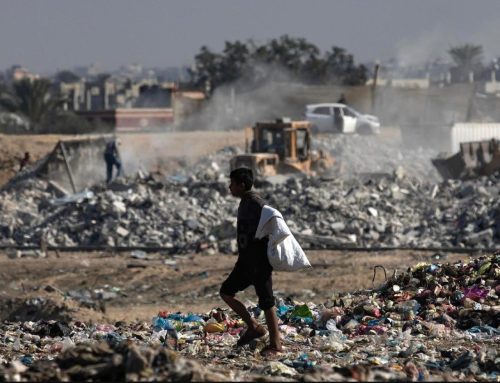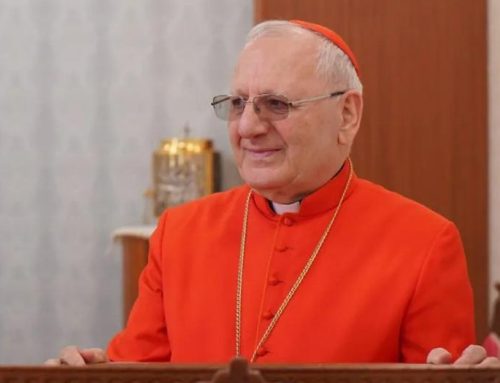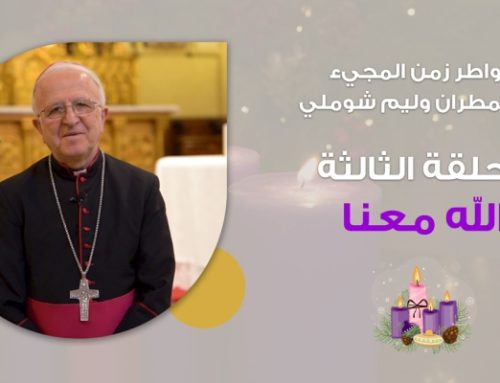American Jesuit Peter DuBrul risks his life every day by breaking the curfew and walking from his apartment to Bethlehem University to say Mass in the town where Jesus was born. As head of the Department of Religious Studies, the 65 year-old Cincinnati native has taught at the university for nearly thirty years. He and his colleagues at the Vatican-sponsored Bethlehem University are quietly and defiantly refusing to leave. For the first time in its 26 years of operation, it was recently occupied by the Israeli army. Although western diplomats have offered to evacuate them, they ask, “What sort of Christian witnesses would we be if we left now?”
American Jesuit Peter DuBrul risks his life every day by breaking the curfew and walking from his apartment to Bethlehem University to say Mass in the town where Jesus was born. As head of the Department of Religious Studies, the 65 year-old Cincinnati native has taught at the university for nearly thirty years. He and his colleagues at the Vatican-sponsored Bethlehem University are quietly and defiantly refusing to leave. For the first time in its 26 years of operation, it was recently occupied by the Israeli army. Although western diplomats have offered to evacuate them, they ask, “What sort of Christian witnesses would we be if we left now?”
The university has not held classes since Israeli missiles smashed gaping holes into its newest buildings and blew apart classrooms. Now, like everyone else in the town, the university is also under a curfew imposed by the Israeli army as part of its determination to punish Bethlehem for its fierce resistance to Israeli Occupation. No one has been allowed out for almost three weeks, except for a couple of brief breaks to go shopping, and many of Bethlehem’s Christian and Muslim inhabitants are without food or water. On one such occasion, Ali Farah, 60, a resident of Dheisheh refugee camp was passing near the university in search of food for his family when he was killed by a gunshot in the chest by an Israeli sniper.
Twelve Christian De La Salle Brothers run the university; eight Americans, three Britons, and one Palestinian Brother. From the window of their community’s living room, they can see the besieged Church of the Nativity, the site marking Jesus’ birthplace. Last week, they watched in horror as heavy gunfire broke out around the church, with Israeli forces firing from all directions. A Greek Orthodox chapel caught fire, and those in the church who tried to extinguish it were shot at by Israeli soldiers, killing Khaled Abu Siam, 23, with a gunshot in the head. The church bell ringer Samir Salman, 42, was also shot dead while walking to his job. His body was later found in one of the church’s inner courtyards. “I think it would be devastating, if the Church of the Nativity was assaulted,” commented Brother Mark, who came from the UK to teach English at the pontifical university.
Inside the Church of the Nativity, one of Christianity’s holiest sites, 240 Palestinian militants and civilians, including women and children, fleeing the Israeli assault on the town have been claiming sanctuary for the past three weeks. Parts of the church have no electricity or water, and the body of a Palestinian policeman killed earlier in the stand-off is now said to be rotting in a cave within the compound.
About 40 monks in the church, mostly Franciscans, along with a few nuns who are tending to the wounded in the Holy Manger grotto, have volunteered to remain with the Palestinians to prevent a bloodbath. Conditions were said to be deteriorating fast. Food has run out, and almost no water is left. Every night, the church is bombarded with ear-splitting noises from loud speakers hoisted above Manger Square as a kind of psychological warfare.
Michael Sabbah, the Latin Catholic Patriarch of Jerusalem, said the Israeli army should withdraw and allow the people inside the church to leave freely. “These people are refugees,” the Patriarch said. “They took refuge inside the church. For us, once they have taken refuge, they are human beings. They are no longer fighters. “An exceptional situation was created that overrides all military codes. They should be allowed to leave unharmed and without threat of imprisonment.”
So far, Israel has refused to allow church authorities to take part in the negotiations to end the stand-off. The Patriarch, a Palestinian, argues, “I am not for the Palestinians,” he said. “I am for the oppressed.” “This is not a war on terror,” he insisted. “It is a war against occupation.”
Edmond Durst taught English for more than twenty years at various universities in the Middle East.





